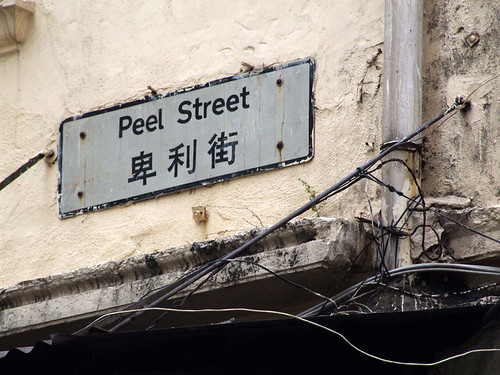I had travelled more than 15,000 kilometres only to stand, once again, at the corner of Peel and Wellington. Of course, it wasn’t the same Peel and Wellington as back home — with a shared colonial past, it shouldn’t be surprising to find some similar street names in both Montreal and Hong Kong.
In Montreal, Peel and Wellington finds itself in the heart of Griffintown, a neighbourhood that was once a centre of industry and working-class Irish life. In Hong Kong, it sits in the middle of a busy market district in Central, an area that was once part of Victoria City, Britain’s nineteenth-century foothold in South China. It seems somehow appropriate that, even halfway across the world from one another, Peel Street and Wellington Street intersect. Peel was named after Robert Peel, a Tory who first elected to Parliament in a “rotten borough” home to just 24 easily-bribed voters, and who served twice as Prime Minister, from 1834-35 and 1841-46. Wellington Street was named after Peel’s longtime ally, the Duke of Wellington, another two-time Prime Minister who served one of his terms immediately after Peel.
There are plenty of other names that will ring familiar to anyone who has spent time in a former outpost of the British Empire: Elgin, Dalhousie, Drake, Drummond, Granville, Argyle. Like shadows left behind by a passing giant, they testify to a kind of globalization that began before the term even existed.



4 comments
That’s a very interesting remark. I had a thought today about street names, as I was walking in the streets of Taipei. There were several historical personalities streets like “Roosevelt” or “Zhongshan” (no CKS, however), a number of streets named for general stuff like the equivalent of “Du Parc”, and then, something that we don’t have here, names of cities in China, like “Chongqing”, “Chengdu” or “Nanjing”. The latter seems like a remarkable constant, whether you are in Beijing, Shanghai, or Hong Kong (“Peking Road”, anyone?).
Naming streets after other places is actually very common in Canada. In Vancouver’s Mount Pleasant there are streets named after Alberta, Manitoba, Quebec, Ontario and Prince Edward (Island), along with streets named after Ontario cities like Guelph and St. Catherines. Most Ontario towns and cities have either a Montreal Street or a Toronto Street.
In Calgary there’s an entire neighbourhood whose streets are named after places and people in Montreal and Quebec:
http://www.urbanphoto.net/blog/2007/09/24/calgarys-montreal-suburb/
Some examples include Frontenac Avenue, Montreal Avenue, Wolfe Street, Cabot Street, Montcalm Crescent, Talon Avenue, Laval Avenue and Dorchester Avenue. The streets were given their Quebec-themed names as a nationalistic response to a movement by local Americans to name the streets after US presidents.
Very interesting..
I’ve always thought of some similarities between HK and Montreal. Both were dominated by the British for decades and have established a sizable ‘expatriate’ community, although there are much more chinese than westerners in HK where in Montreal, Anglophones still represent a significant minority. Also, English education was mandatory, I wonder if that is still the case.
I’d be curious to see the amount of westerners in HK and how much that number has decreased since the handover in 1997, especially that HK bills itself as ‘Asia’s World City’ where there is a certain amount of multiculturalism..
I can’t wait to go this summer!
I think there are some pretty significant differences between Hong Kong and Montreal. Don’t forget that Hong Kong was still a colony until 1997 whereas Montreal ceased to be under the control of Britain in the mid-19th century. Most anglophones here trace their roots to ancestors who were immigrants rather than expatriate sojourners.
To answer your question, it’s hard to say whether the number of “Westerners” in Hong Kong has increased or declined. By most accounts, the number of white people is smaller than before 1997, but the number of Canadian and American citizens has increased exponentially. Many of them are “returnees” (HK Chinese who emigrated before 1997 and returned after gaining an overseas citizenship) but many are also overseas-born people of Chinese descent who might consider themselves more culturally Western than Chinese.
As has always been the case, though, the majority of non-Chinese people in Hong Kong are actually people of Indian, Pakistani and Nepalese descent. I believe the local South Asian population is about 250,000 and most are either locally-born or HK permanent residents. There are actually Cantonese-speaking Indian families in Hong Kong and it’s not uncommon to see schoolkids of Indian origin speaking Cantonese with each other.
There are also many Southeast Asians (mostly Filipinos and Indonesians) and a small but quickly-growing and highly-visible number of African immigrants, refugees and expatriates.
I suppose that, compared to most Asian cities, Hong Kong is multicultural, especially since there is a certain degree of openness that isn’t evident in most other places on the continent. But most ethnic minorities remain excluded from mainstream society, whether they speak Cantonese or not, and most Western expats exist in a bubble of their own. Despite all of the good that British rule did for Hong Kong, it’s hard to shake off the nastiest bits of the colonial legacy, like the sense of entitlement that many Hong Kongers have when it comes to Filipina and Indonesian domestic helpers.